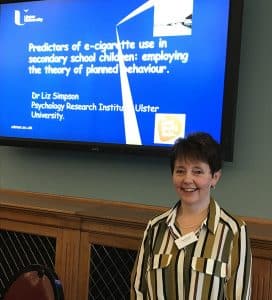Blogs
Keep up with all the latest thoughts and opinions.
We make it happen.
Online Health Psychology MSc: An Interview with the Course Director
Friday, March 17th, 2023

Are you interested in studying Health Psychology and want to know more? We spoke with Dr Liz Simpson, Course Director of the BPS-accredited, online Health Psychology MSc and Senior Lecturer at Ulster University.
In this interview, Dr Simpson shares her experience and knowledge of the field.
Introducing your course leader

In addition, she has strong connections with industry bodies, having held chair positions within the Division of Health Psychology Northern Ireland Branch and Training Committee.
Q&A with Dr Liz Simpson
What is health psychology to you?
Health psychology is the application of psychological theory and research methods for the promotion and maintenance of health, and the prevention and treatment of illness. It’s also involved with identifying ideological and diagnostic correlates of health, illness and related dysfunctions.
Health psychology doesn’t only deal with trying to better understand health and illness, it also can be beneficial in relation to healthcare systems. By looking at health information, incidents and prevalence rates of conditions within a certain hospital, we can write reports and make recommendations about what healthcare services might be needed.
How did you first get involved in the field?
I first got involved in health psychology as an undergraduate student, although there wasn’t a health psychology division or anything like that then. I did a placement year in the antenatal clinics in the Royal Victoria Hospital in Belfast, handing out questionnaires to very heavily pregnant women.
I followed that cohort of women for a year postnatal and wrote my final year dissertation looking at the incidents, prevalence rates and predictors of post-natal depression. That’s really where my interest and my love of health psychology came from and, from that, I went on to do a Masters.
I was probably one of the first people in the UK to do a Masters in Health Psychology, which I absolutely loved.
How has the field evolved since then, and what has kept you interested all this time?
I think health psychology has really expanded over time. We are seeing a whole range of different programmes and courses across the UK and the number of health psychologists has expanded so much since I graduated.
Within public health, there’s a real need to understand the underlying mechanisms for unhealthy behaviours and how we can design more effective interventions. And I think the awareness of that – and the need for it – across the health service has really come to the fore over the last few years.
I’m very proud to say that two of our graduates are now working in posts within the health service in Northern Ireland, which is a big step in the right direction. To know that they’re campaigning and promoting health psychology within the healthcare system here is fantastic.
We also have international students who have done some absolutely amazing work in their own country of origin. I can think of one former international student who began working alongside clinical psychologists but with a focus on health. From there, she grew a team of five or six people all working in the area of health psychology.
Our students do some absolutely fantastic things. The sky’s the limit, really.
How can health psychology principles benefit society?
Health psychologists will look at health at different levels. We can look at public health across a population, we can look at community health and we can look at the health of the individual.
We are equipped to design interventions across these three levels and we’re very much about establishing the health needs of the population and its communities. There is so much potential to address many of the health inequalities that we see, considering things like socioeconomic status.
If you look at some of the major killers or long-term chronic conditions in our society today, like coronary heart disease, diabetes, obesity and various forms of cancer, very often if you look at the risk factors for all those different conditions, you’ll see their lifestyle choices are significant factors. These factors include things like smoking, not engaging in physical activity and having a poor diet.
Health psychologists can be instrumental in designing more effective interventions to try and combat those unhealthy choices. We also have good knowledge and understanding of those chronic conditions and their implications.
When you’re diagnosed with a chronic complaint, you very often have to make very drastic lifestyle changes, and not everybody is likely to follow their doctor’s orders without real guidance.
So, health psychologists could be instrumental in providing better support and designing more effective interventions to mediate the process and change those problematic areas of their lifestyle.
How does Ulster maintain links with healthcare industries around the world?
The main way is through our research. We have a very research-active team at Ulster and we work with health trusts, the Public Health agency and centres of excellence both nationally and internationally.
We also work closely with the UK’s main professional body, the British Psychological Society and the Psychological Society for Ireland, which is important in order to keep us up to date in our field. Our training changes and adapts to meet the needs of an evolving discipline, and an evolving healthcare setting as well.
Why is it so important for a Health Psychology Masters to have BPS accreditation?
BPS accreditation gives us professional recognition. As the UK’s professional body, the BPS set the standards for training across the whole of the UK, and you need to have an accredited MSc in order to progress to Stage 2 Training in Health Psychology.
If you don’t have a BPS-accredited MSc, then you will not get entry into Stage 2 Training in Health Psychology. So, it’s important that every course has that BPS accreditation stamp. It basically tells the student that we are covering the curriculum and that our course meets the standards required and set by the BPS.

How does specialisation on the MSc programme work?
The students that come onto our programme are quite diverse, so we try and keep our assignments broad enough to allow students to bring their own interests to the table.
For instance, on my module, Models and Applications in Health Psychology, the students are asked to design a health promotion campaign and they can decide for themselves what they want to focus on. If they’re already working in a health-related area with a particular target group, they can write their health promotion campaign around what they’re doing in their daily job, which will benefit them.
Students can also bring their own research area of interest to their dissertation. We also have a very broad range of research topics that are of interest to our academic team on the programme. So, there’s something in there for everybody.
What skills do MSc students graduate with?
Students will gain a solid understanding of health psychology, its research methods and its theoretical underpinnings. They will gain experience using qualitative and quantitative research methods and will use a range of statistical packages, such as SPSS and Nvivo. Critical reasoning skills, problem solving and ethical thinking are among some of the skills obtained as part of this programme. Through the assignments on this programme, students also get an opportunity to put these skills into practice.
From start to finish, they’ll be working on project management skills. They will also learn to write a range of different report styles, including how to write health promotion campaigns and mini systematic reviews.
All of the skills that students acquire as part of the programme will benefit them when they move forward. It’s all relevant and gets students thinking about how they can work with other health professionals and clients.
What is one of the biggest benefits of doing the Masters online?
Students like the flexibility of online learning. The MSc allows them a certain amount of flexibility that they’re not being asked to study at a specific time on a specific day.
We know that our students are working and that they’ve got family commitments. Some of them might even be carers. So, we are very mindful of incorporating that need for flexibility into how we manage and run this programme. From our years of experience teaching online, we know that this is what students want and need.
What students would you like to see enrol on the MSc, in terms of mindset, ambition or skill set?
We would really love to have ambitious students who are willing to be challenged. We want committed students who engage with the learning materials and we want to see them flourish and progress.
If you’re dedicated and you’re willing to put the time and effort in, you will do well on our programme.
What is the most common route of progression for students after graduating from the MSc programme?
Some graduates will go on to Stage 2 Training in Health Psychology, a lot of students might go on to do a PhD and some will do their PhDs with us.
Other students will use the Masters degree to get promoted within whatever role they’re in at that point in time. Some are already working within the health service, so they can use the knowledge that they have gleaned from their Masters degree to improve what they’re doing in their job on a daily basis.
It really depends on their motivations for doing the Masters and those can be quite varied. In the past, we’ve had a significant number who have gone on to complete Stage 2 Training programmes.
What types of student support does Ulster offer?
I think we’re very unique in the amount of student support we offer on this programme. We have Student Success Advisors who support students with any kind of daily issues around studying, such as accessing the library and other services.
We have Study Advisors who are there to provide academic support and we have E-Tutors who are there to lend another layer of support within a particular module. Then, our Module Coordinators can also be contacted as another layer of support at a module level.
We’ve always been very good to our students and we’re very approachable as a programme team. If students have any worries or concerns, they can email us and discuss that with us directly.
Study health psychology with Ulster Online
Studying health psychology at Ulster University is a great choice if you are interested in the field and would like a uniquely flexible way to gain Stage 1 Training in Health Psychology – a must if you are aspiring to become a Registered Health Psychologist in the UK. This is also the preliminary step to gaining access onto a Stage 2 programme, where the minimum requirement is two years of professional supervised practice.
Ulster’s online BPS-accredited MSc in Health Psychology offers an excellent opportunity to learn and develop professional skills in the field, with a focus on research methods, application, and intervention design. Read our FAQs for information on how to apply.
Dr Liz Simpson leads an expert team of research-active academics who work collectively to drive forward health psychology and make a difference in global healthcare.


